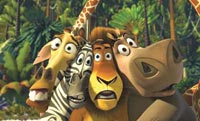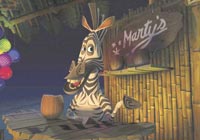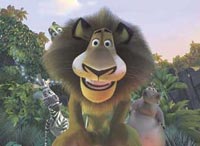 |
Apparently, a 10th birthday is a big thing for a zebra. As Madagascar opens, Marty the zebra (Chris Rock) is celebrating this milestone, complete with presents from his three best friends, a lion named Alex (Ben Stiller), a hippo named Gloria (Jada Pinkett Smith), and a hypochondriacal giraffe named Melman (David Schwimmer). This special day makes Marty reflect on his cush life in the Central Park Zoo—where he and his friends enjoy a lifestyles-of-the-rich-and-famous existence in between entertaining the good folks of New York City—and wonder what lies beyond those gates.

This wanderlust is fueled in part by the penguins, who put fanciful ideas in Marty’s head about the “wilds of Connecticut” while trying to dig their way there themselves with plastic spoons and Popsicle sticks. When Marty shares his birthday-candle-blowing dream of going wild with his best buds, they don’t get it. After a bit of birthday brooding, he decides to trot out the door on his own after lights-out that night and take the subway north toward adventure. When his friends stage an intervention, they all get caught and shipped to Africa. On the way, the penguins stealthily commandeer the ship and set their sights on Antarctica, a sharp change of course that knocks our four crated friends overboard, only to wash ashore in Madagascar.
Up to this point the pace and premise have been pleasing. Marty is relatably wistful as he wonders if there’s something more to life. Alex is endearingly brash as the zoo’s “mane” attraction. Melman is laughably neurotic as he traipses the mean streets of New York with Kleenex boxes on his feet to protect him from the grime. And Gloria is the lovable fly-girl hip-o who keeps them all in line.

But unfortunately, the ship isn’t the only thing that loses course partway through the movie. As soon as they land on Madagascar’s sandy beach, the momentum peters out and we’re left with bathroom humor and animal in-fighting. The fearful foursome eventually stumble on a lemur colony, headed by the self-appointed King Julien the 13th (Sacha Baron Cohen, a.k.a. Ali G), an Indian-accented party animal who tries to woo Marty and company to stay and protect his dance-crazy tribe from the menacing Foosa predators. And in a strange plot twist, Alex starts wanting to snack on his friends as his more feral tendencies surface in the wild. Thinking he’s turning into a monster, Alex abandons his buddies for the “dark,” meat-eating side of the island and creates a cage for himself so he doesn’t go feast on his friends. There are many circle-of-life messages that get confusing at best.

Though it might seem nitpicky to note plot flaws in a cartoon, all I really want is a moral to the story—a pretty standard element in kid flicks, no? In Finding Nemo: Don’t let fear rule your life. In Shrek: True beauty comes in all shapes and sizes. In Madagascar: well, I’m not really sure. Don’t eat your friends? Be a vegetarian? Don’t stray too far from home because your more animal instincts will take over? Deny your natural makeup for the good of your friends—and society at large? What’s unfortunate is that there was great plot potential—our four-legged protagonists could have used their New York chutzpah to make their way in the wild, Marty and friends could have learned there is more to life than pampering and the bricked-in environment of the city, or this wide array of animals could have learned to appreciate the diversity of friends old and new.

There are other problems as well. We don’t get enough of the precocious penguins, who steal every scene with their conspiracy theories and Mission Impossible-like adventures. And while there are clever references to American Beauty, Cast Away, and Chariots of Fire, there’s also too much low-brow hypochondriac humor (bladder infections, rectal thermometers, and poop references) and not one, but two tranquilizer dart drugged-up delusion sequences. As the movie progresses, the humor threshold gets lower and lower.
And just as the movie runs out of steam, the final credits save the day. While King Julien the 13th belts out the infectious (read: those with small children will hear this lyric nonstop for days) “I Like to Move It,” the various characters dance alongside the scrolling names. The best by far is the King and his stoic sidekick Maurice (Cedric the Entertainer) doing the robot dance. Who doesn’t love a good lemur-doing-the-robot gag? And the penguins link arms (fins?) and do a little can-can action. Funny stuff. If only they’d spread some of this genuine humor throughout the rest of the movie.
Talk About It
Discussion starters- Do you think it was right for Alex to feel bad about his naturally carnivorous tendencies?
- What do you think was the main message of the movie?
- Have you ever, like Marty, wondered if there’s “more to life than this”? What did you do about it? What did you learn in that process?
- What’s the benefit of venturing away from home and experiencing people and places very different to what you’re used to? Have you ever done this? What did you learn?
The Family Corner
For parents to considerMadagascar is rated PG for mild violence, crude humor and some thematic elements. There’s a bit of bathroom and belching humor and a couple of lion attack scenes that could scare the youngest viewers, but otherwise this PG-rated flick is reasonably family-friendly.
Photos © Copyright DreamWorks SKG
What Other Critics Are Saying
compiled by Jeffrey Overstreetfrom Film Forum, 06/02/05Featuring a whole zoo full of celebrity voice talents—Ben Stiller, Chris Rock, David Schwimmer, Jada Pinkett Smith, and more—Dreamworks’ latest animated feature, Madagascar, refused to be crushed by the Dark Side of the Force. It scored an impressive opening weekend (approximately $61 million), not far behind Star Wars: Episode III—Revenge of the Sith ($70 million), which held on to the top spot for the second straight week.
In his first directorial effort since 1998’s underrated Antz, Eric Darnell delivers a story about the misadventures of mismatched creature companions who have escaped the extravagant luxuries of New York’s Central Park zoo in order to seek their natural habitats. Together, Alex the Lion (Stiller), Marty the Zebra (Rock), Melman the Giraffe (Schwimmer), and Gloria the Hippo (Pinkett Smith) cause enough trouble to earn them a one-way tickets to Kenya. But the voyage runs into trouble, and they wind up in … well, check the title.
Camerin Courtney (Christianity Today Movies) says, “As the movie progresses, the humor threshold gets lower and lower. And just as the movie runs out of steam, the final credits save the day.”
She also writes, “Though it might seem nitpicky to note plot flaws in a cartoon, all I really want is a moral to the story—a pretty standard element in kid flicks, no? In Finding Nemo: Don’t let fear rule your life. In Shrek: True beauty comes in all shapes and sizes. In Madagascar: well, I’m not really sure. Don’t eat your friends? Be a vegetarian? Don’t stray too far from home because your more animal instincts will take over? Deny your natural makeup for the good of your friends—and society at large?”
Peter T. Chattaway, a regular critic at Christianity Today Movies, reviewed Madagascar for CanadianChristianity.com. It’s a positive review, but perhaps his most interesting observation is that the movie “had me wondering about the place of the food chain in Christian thought. Psalm 104 celebrates how lions ‘roar for their prey and seek their food from God,’ but Isaiah 11 and 65 say lions will become peaceful vegetarians when the messianic age dawns. To what degree are these passages poetic, and to what degree are they meant to be taken literally? … Madagascar hardly settles these themes, but it explores them in an interesting way.”
Jonathan Rodriguez (Christian Spotlight) sees the film as highlighting “the importance of friendship.” And he confesses, “Madagascar made me laugh quite a bit, which I wasn’t really expecting from this particular animated film. I suspect that parents may enjoy it just as much as their children.”
“Visually, Madagascar is a delight,” writes David DiCerto (Catholic News Service). But he says the beginning is stronger than what follows. “Once the action switches to the island setting, the film’s sharp wit gives way to a slapstick brand of broad cartoon comedy which, though quite funny at times, is more sight gags than story.”
Annabelle Robertson (Crosswalk) says the film’s message is “buried and weak,” and tries to explain it: “Madagascar seems to be saying that we should be happy wherever we are in life, and that we should recognize the importance of loyalty and friendship. In a nod to animal activists, it also points to the beastly nature of animals, and how we can only tame that nature so much.” She expects it will “please families and children alike.”
Tom Neven (Plugged In) says, “This animated feature lampoons stories that sentimentalize the wild kingdom. Still, you leave the theater wondering what result you were supposed to root for—that the animals make it back to their safe zoo existence or learn to live ‘authentically’ as wild animals.” The screenplay, he observes, seems to have been “written by a committee.” But he’s happy to see “the power of friendship and self-sacrifice” exalted.
Michael Elliott (Movie Parables) says, “The computer animated artwork is sharp and clean. The characters are distinct and the humor is somewhat clever. So what’s the problem?” He blames the cast and “bland vocal performances.” He adds, “The film explores an unusually deep subject, albeit in a superficial way.”
Mainstream critics offer many varying responses, most of them positive. Kenneth Turan (Los Angeles Times) calls the film “a classical gas” and notes that it “benefits from not having any heavy moral to impart or life lesson to teach. It simply wants you to crack a smile, and … it has no trouble managing that.”
from Film Forum, 06/09/05Andrew Coffin (World) says, “The movie falls into the category of the ‘mostly harmless’—diverting entertainment for kids that is unlikely to inspire them or infuriate their parents.”
Copyright © 2005 Christianity Today. Click for reprint information.












